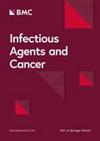多发性骨髓瘤患者在自体干细胞移植过程中感染 COVID-19:病例报告和文献综述。
IF 2.8
2区 医学
Q3 IMMUNOLOGY
引用次数: 0
摘要
本文介绍了两例多发性骨髓瘤患者在自体干细胞移植过程中感染COVID-19的情况、治疗过程以及不同的治疗效果,为如何在COVID-19正常化阶段安全进行自体干细胞移植提供了参考。本文章由计算机程序翻译,如有差异,请以英文原文为准。
The patients with multiple myeloma were infected with COVID-19 during autologous stem cell transplantation: case report and literature review.
This paper introduces two cases of multiple myeloma, COVID-19 infection during autologous stem cell transplantation, the treatment process, and different results of the two patients, which provides a reference for how to carry out ASCT safely during the COVID-19 normalization stage.
求助全文
通过发布文献求助,成功后即可免费获取论文全文。
去求助
来源期刊

Infectious Agents and Cancer
ONCOLOGY-IMMUNOLOGY
CiteScore
5.80
自引率
2.70%
发文量
54
期刊介绍:
Infectious Agents and Cancer is an open access, peer-reviewed online journal that encompasses all aspects of basic, clinical, epidemiological and translational research providing an insight into the association between chronic infections and cancer.
The journal welcomes submissions in the pathogen-related cancer areas and other related topics, in particular:
• HPV and anogenital cancers, as well as head and neck cancers;
• EBV and Burkitt lymphoma;
• HCV/HBV and hepatocellular carcinoma as well as lymphoproliferative diseases;
• HHV8 and Kaposi sarcoma;
• HTLV and leukemia;
• Cancers in Low- and Middle-income countries.
The link between infection and cancer has become well established over the past 50 years, and infection-associated cancer contribute up to 16% of cancers in developed countries and 33% in less developed countries.
Preventive vaccines have been developed for only two cancer-causing viruses, highlighting both the opportunity to prevent infection-associated cancers by vaccination and the gaps that remain before vaccines can be developed for other cancer-causing agents. These gaps are due to incomplete understanding of the basic biology, natural history, epidemiology of many of the pathogens that cause cancer, the mechanisms they exploit to cause cancer, and how to interrupt progression to cancer in human populations. Early diagnosis or identification of lesions at high risk of progression represent the current most critical research area of the field supported by recent advances in genomics and proteomics technologies.
 求助内容:
求助内容: 应助结果提醒方式:
应助结果提醒方式:


